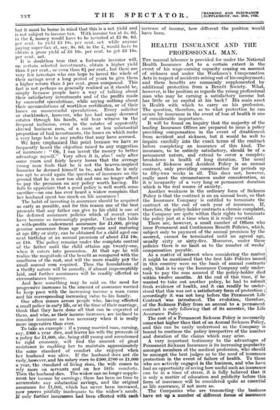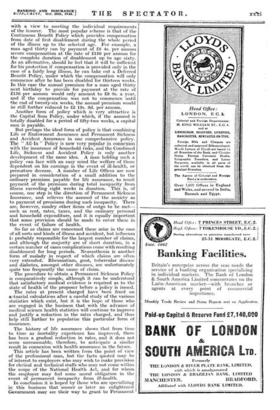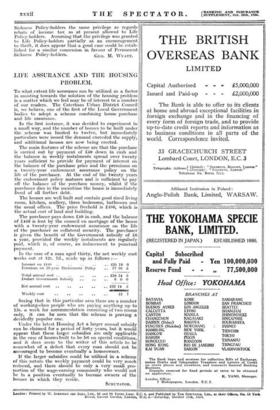HEALTH INSURANCE AND THE PROFESSIONAL MAN.
Trim manual labourer is provided for under the National Health Insurance Act to a certain extent in the event of his wage-earning capacity ceasing on account of sickness and under the Workmen's Compensation Acts in respect of accidents arising out of his employment; and these benefits are commonly supplemented by additional protection from a Benefit Society. What, however, is the position as regards the young professional man who may be earning a satisfactory income but has little or no capital at his back? His main asset is Health with which to carry on his profession. The question, therefore, as to what protection he can secure by insurance in the event of loss of health is one of considerable importance. It will be found on inquiry that the majority of the leading Insurance Offices are prepared to issue a policy providing compensation in the event of disablement from- accident and sickness, but it would be well to inquire carefully into the exact terms of the contract before completing an insurance of this kind. The insurance, to be entirely satisfactory, should be of a permanent nature, and extend to cover a complete breakdown in health of long duration. The usual form of Sickness and Accident Policy is an annual contract, only providing compensation for periods up to fifty-two weeks in all. This does not, however, really meet the circumstances under consideration, as it is incapacity of a very long or permanent duration which is the real source of anxiety. Another weakness in the ordinary form of Sickness Policy is that the contract is on an annual basis, so that the Insurance Company is entitled to terminate the contract at the end of each year of insurance. If, therefore, the policy-holder contracts a chronic complaint, the Company are quite within their rights to terminate the policy just at a time when it is really essential. There are, however, a small number of Offices who issue Permanent and Continuous Benefit Policies, which, subject only to payment of the annual premium by the assured, cannot be- terminated until an agreed age, usually sixty or sixty-five. Moreover, under these policies there is no limit as to the number of weeks' compensation payable. As a matter of interest when considering the matter] it might be mentioned that the first Life Policies issued in this country were on the basis of annual contracts only, that is to say the Insurance Company only under- took to pay the sum assured if the policy-holder died within twelve months. At the end of this time, if he wanted to- take out another policy, he had to submit] fresh evidence of health, and it can readily be under-, stood that this was not a satisfactory form of protection ;1 accordingly it was not long before the Permanent. Life Contract was introduced. The evolution, therefore, of the Sickness Policy from an annual to a permanent contract is only following that of its ancestor, the Life Assurance Policy.
The cost of a Permanent Sickness Policy is necessarily somewhat higher than that of an Annual Sickness Policy, and this can be easily understood as the Company is bound to continue the policy irrespective of the number and duration of the claims which may arise.
A very important testimony to the advantages of Permanent Sickness Insurance is its increasing popularity amongst members of the medical profession, who should be amongst- the best judges as to the need of insurance protection in the event of failure of health. To those who are actively engaged in the business, and who have had an opportunity of seeing how useful such an insurance can be in a time of stress, it is fully believed that it is only a matter of education and publicity before this form of insurance will be considered quite as essential as life assurance, if not more so.
The Companies who are transacting the business have set up a number of different forms of insurance with a view to meeting the individual requirements of the insurer. The most popular scheme is that of the Continuous Benefit Policy which provides compensation from date of first disablement during the whole period of the illness up to the selected age. For example, a man aged thirty can by payment of E8 4s. per annum secure compensation at the rate of 1156 per annum for the complete duration of disablement up to age sixty. As an alternative, should he feel that it will be sufficient for his protection if compensation is provided only in the case of a fairly long illness, he can take out a Deferred Benefit Policy, under which the compensation will only commence after he has been disabled for thirteen weeks. In this case the annual- premium for a man aged thirty next birthday to provide for payment at the rate of £156 per annum would only amount to 13 9s. a year, and if the compensation was not to commence until the end of twenty-six weeks, the annual premium would be still further reduced to £2 13s. 3d. per annum. Another form of policy which is very attractive is the Capital Sum Policy, under which, if the assured is totally disabled for a period of fifty-two weeks, a capital sum is payable.
But perhaps the ideal form of policy is that combining Life or Endowment Assurance and Permanent Sickness and Accident Assurance in one comprehensive policy. The " All-In " Policy is now very popular in connexion with the insurance of household risks, and the Combined Life, Sickness and Accident Policy is only another development of the same idea. A man holding such a policy can face with an easy mind the welfare of those dependent on his earnings in the event of ill-health, or premature decease. A number of Life Offices are now prepared in consideration of a small addition to the ordinary premium payable for life assurance, to remit payment of the premium during total incapacity from illness exceeding eight weeks in duration. This is, of course, one step in the direction of Permanent Sickness Insurance, and relieves the assured of the anxiety as to payment of premiums during such incapacity. There are, however, sundry other items of outgo to be met— such as rent, rates, taxes, and the ordinary personal and household expenditure, and it is equally important that some provision should be made to cover these in the event of failure of health.
So far as claims are concerned these arise in the case of all sorts and kinds of illness and accident, but influenza probably responsible for the largest number of claims, and although the majority are of short duration, in a certain number of cases complications come with resulting disablement for long periods. Neurasthenia is another form of malady in respect of which claims are often very extended. Rheumatism, gout, tubercular disease and diabetes, amongst other diseases, are unfortunately quite too frequently the cause of claim. The procedure to obtain a Permanent Sickness Policy is comparatively simple, although it can be understood that satisfactory medical evidence is required as to the state of health of the proposer before a policy is issued.
The rates at present charged have been fixed on satuarial calculations after a careful study of the various statistics which exist, but it is the hope of those who are engaged in the business that with the advance of medical science health statistics will continue to improve and justify a reduction in the rates charged, and thus help still further to popularize this particular form of insurance.
The history of life assurance shows that from time to time as mortality experience has improved, there has been a gradual reduction in rates, and it does not seem unreasonable, therefore, to anticipate a similar result in connexion with health assurance in the future.
This article has been written from the point of view of the professional man, but the facts quoted may be of interest to employers who may wish to make provision for clerical and technical staffs who may not come within the scope of the National Health Act, and for whom the. employer may feel some moral obligation in the event of permanent incapacity from ill-health. In conclusion it is hoped by those who are specializing in this business that sooner or later an enlightened Government may see their way to grant to Permanent Sickness Policy-holders the same privilege as regards rebate of income tax as at present allowed to Life Policy-holders. Assuming that the privilege was granted to Life Policy-holders partially as an encouragement to thrift, it does appear that a good case could be estab- lished for a similar concession in favour of Permanent




























































 Previous page
Previous page